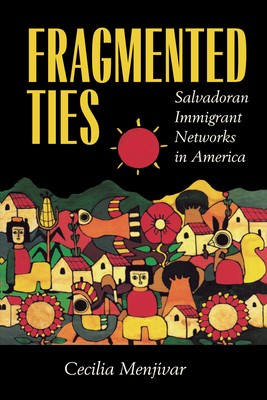
- We will send in 10–14 business days.
- Author: Cecilia MenjÃvar
- Publisher: University of California Press
- ISBN-10: 0520222113
- ISBN-13: 9780520222113
- Format: 15.2 x 22.8 x 1.9 cm, softcover
- Language: English
- SAVE -10% with code: EXTRA
Reviews
Description
In one of the most comprehensive treatments of Salvadoran immigration to date, Cecilia MenjÃvar gives a vivid and detailed account of the inner workings of the networks by which immigrants leave their homes in Central America to start new lives in the Mission District of San Francisco. MenjÃvar traces crucial aspects of the immigrant experience, from reasons for leaving El Salvador, to the long and perilous journey through Mexico, to the difficulty of finding work, housing, and daily necessities in San Francisco. Fragmented Ties argues that hostile immigration policies, shrinking economic opportunities, and a resource-poor community make assistance conditional and uneven, deflating expectations both on the part of the new immigrants and the relatives who preceded them. In contrast to most studies of immigrant life that identify networks as viable sources of assistance, this one focuses on a case in which poverty makes it difficult for immigrants to accumulate enough resources to help each other.
MenjÃvar also examines how class, gender, and age affect immigrants' access to social networks and scarce community resources. The immigrants' voices are stirring and distinctive: they describe the dangers they face both during the journey and once they arrive, and bring to life the disappointments and joys that they experience in their daily struggle to survive in their adopted community.
EXTRA 10 % discount with code: EXTRA
The promotion ends in 17d.07:54:10
The discount code is valid when purchasing from 10 €. Discounts do not stack.
- Author: Cecilia MenjÃvar
- Publisher: University of California Press
- ISBN-10: 0520222113
- ISBN-13: 9780520222113
- Format: 15.2 x 22.8 x 1.9 cm, softcover
- Language: English English
In one of the most comprehensive treatments of Salvadoran immigration to date, Cecilia MenjÃvar gives a vivid and detailed account of the inner workings of the networks by which immigrants leave their homes in Central America to start new lives in the Mission District of San Francisco. MenjÃvar traces crucial aspects of the immigrant experience, from reasons for leaving El Salvador, to the long and perilous journey through Mexico, to the difficulty of finding work, housing, and daily necessities in San Francisco. Fragmented Ties argues that hostile immigration policies, shrinking economic opportunities, and a resource-poor community make assistance conditional and uneven, deflating expectations both on the part of the new immigrants and the relatives who preceded them. In contrast to most studies of immigrant life that identify networks as viable sources of assistance, this one focuses on a case in which poverty makes it difficult for immigrants to accumulate enough resources to help each other.
MenjÃvar also examines how class, gender, and age affect immigrants' access to social networks and scarce community resources. The immigrants' voices are stirring and distinctive: they describe the dangers they face both during the journey and once they arrive, and bring to life the disappointments and joys that they experience in their daily struggle to survive in their adopted community.


Reviews